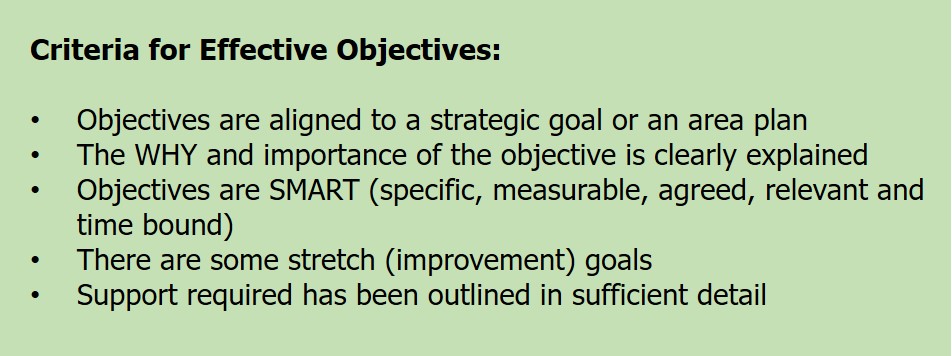
Manager Guidance
Your
role
As a manager of people, you have an important role
to play in ensuring that the efforts of your team all contribute towards the
overall success of the University.
Your
responsibilities include:
· Ensuring your team has SMART objectives and
understands what is expected of them and how their objectives contribute to the
University’s strategy and annual plan.
· Providing specific feedback (both positive and
developmental) as part of mid-year and year-end conversations
· Coach and support team members in achieving their
objectives
· Preparing and conducting two way performance and
career & development conversations as part of the My Contribution process
Benefits of the My Contribution process
- Supports open conversations between managers and team members
- Provides clarity, focus and direction as it allows us to identify key
priorities and objectives
- Allows us to reflect on what we deliver and how we fulfil our role.
- Ensures that we focus on and understand the part we play in achieving
the University’s strategic objectives (review our strategy pages here)
- Knowing how your team likes to grow and develop and what motivates them,
allows you to find ways to support their career path. This can be rewarding for
the team, but also for you.
Support your team in effective objective setting
As a manager, you review the annual plan and you
identify ways to incorporate University and standards of measurement (KPI’s)
into individual objectives to ensure targets are met and quality assured. Then
team members, whilst working with their manager(s) on this, will be able to
create their own SMART objectives. We expect someone to set between 3-8 performance
objectives per year. We expect someone to set between 1-3 personal development
objectives per year.
You should review your own and your
team’s objectives, and provide feedback, coaching and support if a team member
either struggles with writing an objective or the objective they have written
doesn’t meet the criteria mentioned below.

Take a look at our SMART objectives examples to help you and your team create SMART objectives:
Supporting your team members with their personal development
Development is not something that you can do to people. People need to want it for themselves, otherwise development and learning may not happen. Effective coaching is the key to support colleagues in identifying their personal career and development objectives. This means there should be a strong emphasis on asking open questions, listening effectively and trying to understand what motivates the team member.
Personal development principles to consider:
- Self-development occurs all the time as people experience life
- Development requires motivation
- Aim is to align development with organisational interests
- Development needs measurement
- Any development is better than no development
Start with questions about aspirations - here are some coaching questions you could consider:- What do you want to achieve in this job?
- What does success look like?
- What do you find difficult and what areas of your job give you most satisfaction?
- What do you want to do differently in the future?
These questions may be helpful too:
- What specific skills or knowledge would be useful for you to develop further? Why? How would that help you?
- How do you think you can do this? How can you apply what you have learned on an ongoing basis? How can you measure success?
- If there is nothing specific you would like to learn, what development would help you create more satisfaction in your current role?
Unconscious bias
Unconscious bias occurs when people favour others who look like them and/or share their values. For example, a person may be drawn to someone with a similar educational background, from the same area, or who is the same ethnicity as them.
Some tips for managers to avoid unconscious bias
- Be aware of unconscious bias, don't rush decisions and consider issues properly
- Justify decisions with evidence and record the reasons for your decisions
- Focus on the positive behaviour of people and not negative stereotypes
The Mid Year Conversation
· Revisit the team’s objectives and prepare specific
examples of how they have performed against these objectives so far.
·
Discuss causes and solutions for any concerns in
delivery against objectives and if needed provide clarity on expectations. Acknowledge
positive observations or behaviours, using specific examples or feedback
received from others
· Inform team members of any organisational,
departmental or team changes that might impact their roles or objectives
·
Agree with the team member where updates to objectives are required
(if any)
·
Identify follow up activities, set time and
work parameters around them
The End of Year conversation
Rating specifically WHAT was achieved and HOW
it was done effectively (through values and behaviours) isn’t easy. Rating WHAT
was done, in terms of SMART objectives is generally easier, mostly because you
have put specific measures in place which indicate whether someone has or
hasn’t achieved objectives. The clearer your measures are, the easier it will
be to rate afterwards.
·
Set expectations for the end of year
conversation in advance
·
Prepare specific feedback and ratings for the
conversation
·
Reflect on each objective (in terms of WHAT and
HOW)
·
Provide honest feedback and at the same time
position this positively

Taking time to complete feedback in detail
shows you value the contributions that team members make, while keeping the
overall tone positive will help to keep the team member engaged. Doing this
well will positively impact the relationship you have with the individual team
members.
Support and guidance for you as a People Manager
There is a variety of support resources available to you. These include instructional videos and guidance documents designed to assist you with viewing, updating, and completing the My Contribution forms on HR Connect. Please visit the My Contribution Support and Training page.
Additionally, workshops are offered to provide further support in setting effective performance objectives and personal development goals.